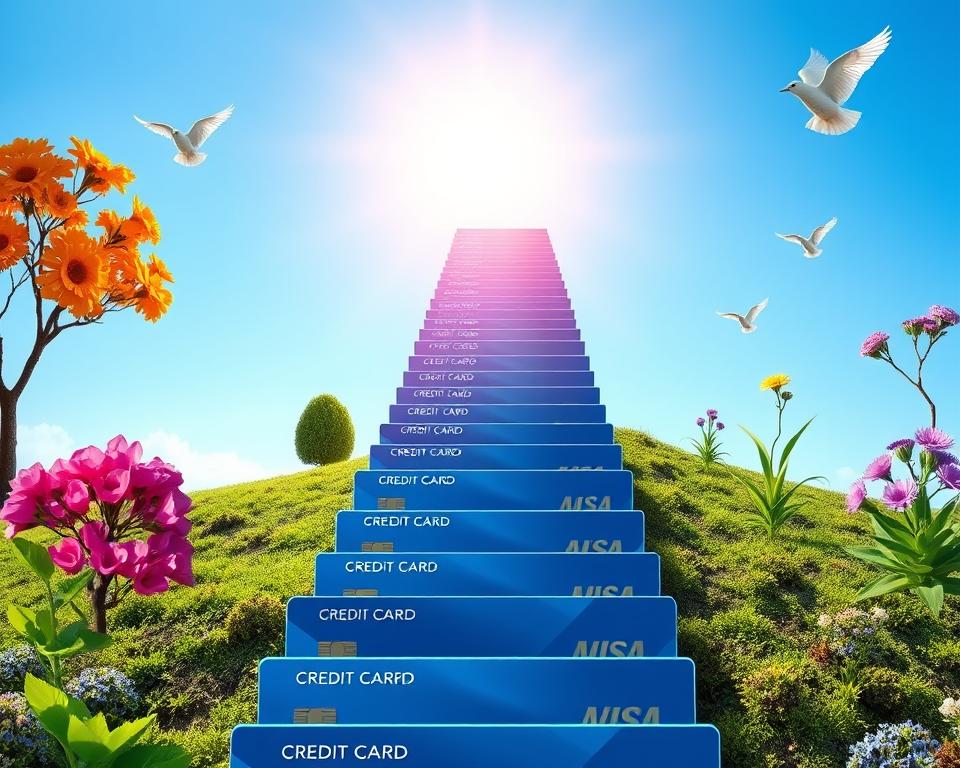Did you know over 40% of Canadians have a credit score below what’s needed for traditional loans?
This fact shows many people have trouble getting personal loans due to bad credit.
You might also like:
You will stay on the same website.
Yet, it’s important to know there still are ways to get a loan. Many think it’s impossible, but with the right info and tools, you can find options.
This article will help you learn how to get funding, no matter your credit score.
Key Takeaways
- Over 40% of Canadians have bad credit, but financing options still exist.
- Understanding bad credit is the first step in securing a personal loan.
- There are various strategies to improve your chances of approval.
- Online lenders and credit unions offer alternative financing solutions.
- Secured personal loans can be a viable option for those with bad credit.
- Rebuilding credit takes time, but there are quick strategies to start.
Understanding Bad Credit and Its Impact
Bad credit can make it tough to get a loan. Knowing what bad credit means is key to dealing with loan issues.
What is Considered Bad Credit?
In Canada, a score below 600 is seen as bad credit. Scores go from 300 to 900, and better scores mean less risk for lenders. Some reasons for bad credit are:
- Missed payments on credit accounts
- High credit utilisation ratios
- Bankruptcies or consumer proposals
- Defaulting on loans
Understanding bad credit is important. This knowledge can help avoid problems when borrowing.
How Bad Credit Affects Loan Applications
Bad credit affects loans a lot. Lenders look at your score and history. People with bad credit might face:
- Higher interest rates to manage the risk
- Tougher loan terms, like small loan amounts
- Rejections or more conditions for loan approval
Knowing these issues can help you be ready to apply for loans, even with bad credit.
Bad Credit? Here’s How You Can Still Get a Personal Loan
Having bad credit doesn’t mean you can’t get a personal loan. You just need to look in the right places. Some lenders might say no, but others offer loans for people with low credit scores. It’s important to know your options to find a loan that fits your situation.
Exploring Your Options
Looking for a personal loan with bad credit? Consider a few alternatives:
- Peer-to-peer lending platforms that connect borrowers with individual investors.
- Payday loans, which provide quick cash but with higher interest rates.
- Car dealerships that offer financing, even for buyers with poor credit scores.
How to Increase Your Chances of Approval
Want to get your loan approved? Try these tips:
- Demonstrate stable income by providing pay stubs or bank statements.
- Consider having a co-signer with good credit, which adds security for the lender.
- Offer collateral, such as a vehicle, to secure the loan and reduce lender risk.
Use these strategies and lending options wisely. They can help people with bad credit get the money they need. Remember, being informed is key to finding the right loan for you.
Alternative Lending Solutions for Bad Credit
Getting financial help with bad credit can be tough. But, many options exist to fit your needs. It’s good to know how online lenders, traditional banks, and credit unions differ. This knowledge will help you choose the right alternative lending solution.
Online Lenders vs Traditional Banks
Online lenders are becoming more popular because they are easy to use and flexible. They often say “yes” faster and might not check your credit as thoroughly as regular banks. This is great for people with bad credit. Benefits of online lenders include:
- Speedy application processes
- 24/7 access to services
- Competitive rates for borrowers
Traditional banks, however, have stricter loan rules which can be tough for those with bad credit. But they are known and trusted and offer many financial products. Let’s look at the differences:
| Feature | Online Lenders | Traditional Banks |
|---|---|---|
| Approval Speed | Fast (often same day) | Slower (can take days) |
| Credit Requirements | More lenient | Stricter |
| Fees | Competitive, but watch for hidden fees | Standardized fees |
| Customer Service | Varies widely | Established customer support |
The Role of Credit Unions
Credit unions are another great option for people with bad credit. They are focused on their members and often have lower rates and more flexible payback terms than banks. Credit unions are especially good because:
- Lower interest rates
- More personalized service
- Community focus
Considering a loan from a credit union could be a smart move if you’re looking to fix your financial situation, even with bad credit.
Secured Personal Loans: A Viable Option
Secured personal loans offer a way to get money when you need it, even with bad credit. You must put something valuable, like your house or car, as a guarantee. This makes the lender more likely to give you a better deal than an unsecured loan.
What are Secured Personal Loans?
Secured personal loans are backed by something valuable you own. This assurance makes lenders more open to giving loans to those with bad credit. You can use your property, savings, or car as this guarantee. For those who might not get an unsecured loan, this is a good choice.
The Risks and Benefits of Secured Loans
The benefits of secured personal loans stand out, especially if you have a low credit score. The perks include lower interest rates, access to more money, and a better chance at getting the loan.
- Lower interest rates compared to unsecured loans
- Access to larger loan amounts
- Improved chances of approval due to reduced lender risk
But, the risks of secured loans cannot be ignored. If you can’t pay back the loan, you could lose your valuable item. This could lead to more debt and financial strain. So, it’s important to check your finances before taking a secured loan.
How to Improve Your Credit Score
Boosting your credit score is key to financial health. Using smart strategies for credit improvement will help you make great strides. We’ll cover immediate actions and long-term tactics for better credit.
Strategies for Quick Credit Score Improvement
For quick boosts to your credit score, try these steps:
- Pay down debts. This lowers your credit use.
- Always pay bills and loans on time for a good payment history.
- Check your credit report for mistakes and fix any you find.
- Avoid too many new credit checks as they can drop your score.
Long-Term Steps for Rebuilding Credit
To rebuild credit for the long haul, here are key moves:
- Get different credit types, like loans and credit cards, to show you can handle them.
- Make a budget that ensures you can pay on time, every time.
- Use credit monitoring to watch your score and know what affects it.
- Be patient and diligent. Improving your credit score takes time and effort.

Debt Consolidation Loans for Bad Credit
Handling many debts can be tough, especially with bad credit. Debt consolidation loans let you merge debts into one easier loan. This helps by reducing everything to a single payment each month. It can also help in managing your finances better.
How Debt Consolidation Works
Debt consolidation loans combine all your debts into one, often with a lower interest rate. This way, you pay less each month and save money over time. You can pick from secured loans, which may need collateral, or unsecured loans. Unsecured loans are easier to get but might have higher rates. It’s vital to understand these options if you’re looking into bad credit debt consolidation.
Choosing the Right Consolidation Strategy
Finding the right strategy means looking at your financial situation and what debts you have. You can choose from several options:
- Secured loans: They have lower interest rates but you might risk losing your collateral.
- Home equity loans: This option uses your home’s equity. It gives you access to more money at lower rates.
- Unsecured loans: These are more accessible if you have bad credit. However, they usually come with higher costs.
Each option comes with its own benefits and downsides. It’s important to think it through for effective debt management.
Subprime Borrowing: What You Need to Know
Subprime borrowing helps people with low credit scores get money they might not get otherwise. It’s important to know about subprime loans’ special traits and risks. This knowledge is key for making good decisions.
The Features of Subprime Loans
Subprime loans have features designed for those with credit issues:
- Higher Interest Rates: These loans usually have higher interest rates due to the increased risk for lenders.
- Lenient Qualification Criteria: They offer easier access to funds for those with bad credit histories because of less strict credit checks.
- Flexible Loan Amounts: Borrowers can choose from different loan amounts to meet their needs.
- Potential for Prepayment Penalties: Paying off these loans early might result in penalties, which can affect financial plans.
Assessing the Risks of Subprime Borrowing
Subprime loans come with big risks:
- Debt Cycle Risk: High-interest loans can trap borrowers in a cycle of debt, making financial problems worse.
- Potential for Default: The shaky finances of subprime borrowers may lead to higher default rates, damaging credit scores.
- Increased Financial Strain: The large payments, due to high-interest rates, can greatly stress budgets.
- Limited Alternative Options: Using subprime loans might block access to better loan options later.
Credit Repair Strategies to Enhance Loan Eligibility
To get approved for a personal loan, it’s key to know and better your credit status. Credit repair can make a big difference in getting eligible, especially for those with not-so-great credit pasts. There are professional credit repair services and DIY methods to consider, each with its own benefits and things to watch out for.
Credit Repair Services: Are They Worth It?
Credit repair services attract those who like a hands-off method. They often deal with credit bureau disputes, possibly leading to faster credit issue resolutions. These services’ costs vary, and it’s crucial to consider if the benefits outweigh the expense. While some people see their scores go up with professional help, others might not find it worth the fees paid.
Do-It-Yourself Credit Repair Tips
DIY credit repair lets you take charge of your credit. Here are some effective ways to improve your credit:
- Review your credit reports: Get your reports from the big credit bureaus and look for mistakes or wrong info.
- Dispute inaccuracies: If you spot errors in your reports, quickly file disputes with the bureau to fix them.
- Negotiate with creditors: Talk to creditors to see if you can arrange for payments or settlements.
- Create a repayment plan: Make a realistic budget and payment plan for your debts.
Using these DIY credit repair steps can greatly improve your credit score. Taking charge of your credit can better your loan obtaining chances at good rates.
| Credit Repair Method | Cost | Time to See Results | Level of Control |
|---|---|---|---|
| Credit Repair Services | High | Quick (1-3 months) | Low |
| DIY Credit Repair | Low or Free | Variable (3-12 months) | High |
Finding the Right Personal Loan for You
When you look for a personal loan, it’s key to understand the terms and conditions. This includes knowing about repayment times, interest rates, and any fees. Make sure to read everything carefully to avoid surprises later.
Understanding Loan Terms and Conditions
Loan terms show the details of your loan agreement. Important parts to understand include:
- Repayment Period: The time you have to repay the loan.
- Interest Rates: What you pay to borrow money, which can change or stay the same.
- Fees: Watch out for extra charges, like origination fees or fees for late payment.
Knowing these details helps you make good choices when picking a personal loan.
Shopping Around for the Best Rates
Don’t just accept the first loan offer you see. It’s important to look around. Tips include:
- Use online tools to compare lots of lenders at once.
- Look at credit unions for better rates.
- Read what other customers say to check if a lender is good.
Comparing rates helps you find a loan that fits your budget and saves you money.
The Application Process for Personal Loans
It’s important to understand how to apply for personal loans. Let’s look at what you need to do, from gathering documents to what happens when your loan is approved.
Gathering the Necessary Documentation
First, collect all the needed documents. You will need:
- Proof of income (pay stubs, tax returns, or bank statements)
- Employment verification (a letter from your employer or recent employment contracts)
- Identification (government-issued ID such as a driver’s license or passport)
- Credit history (credit report, if available)
Having these documents ready speeds up the process and helps your chances of getting a loan.
What to Expect During the Approval Process
The approval process varies by lender. It typically includes these steps:
- Application submission: Fill out the form and provide your documents.
- Credit evaluation: The lender will check your credit and finances.
- Decision making: The lender will decide if you get the loan.
- Fund disbursement: If approved, the money gets deposited into your account.
Approval times can differ. They might take hours or days, depending on the lender and your application’s details. They look at your credit score, how stable your income is, and your current debts.
Conclusion
Dealing with bad credit can make getting personal loans tough. This article has shown ways to find loans even with bad credit. It’s important to know your options, like getting loans from different lenders or secured loans.
Working on improving your credit score is crucial. You can use quick fixes and plan for the long-term to build a solid financial base. Looking into credit repair and combining debts might also help get better loan terms.
Starting on the road to financial health begins with knowing your options and taking action. Recognizing what you can use to manage loans well is the first step. With commitment and smart moves, you can overcome bad credit and reach financial stability.



